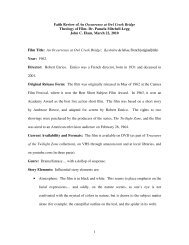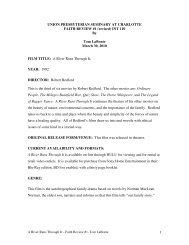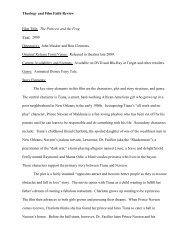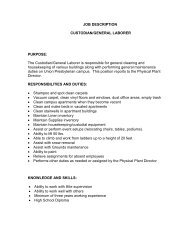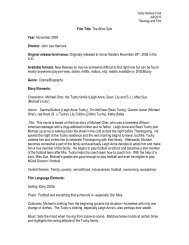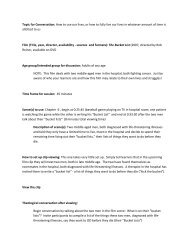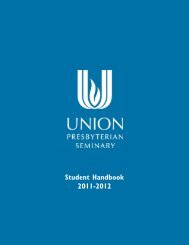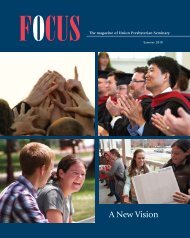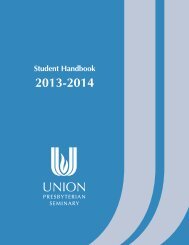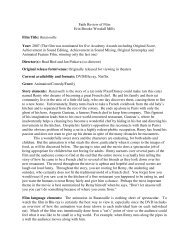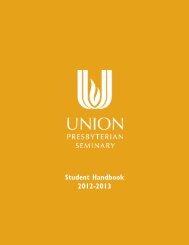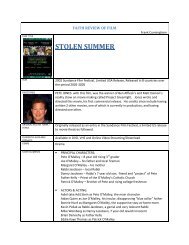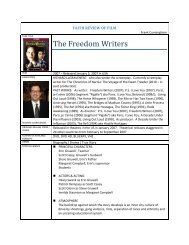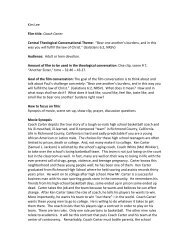Academic Catalog 2010-2011 - Union Presbyterian Seminary
Academic Catalog 2010-2011 - Union Presbyterian Seminary
Academic Catalog 2010-2011 - Union Presbyterian Seminary
You also want an ePaper? Increase the reach of your titles
YUMPU automatically turns print PDFs into web optimized ePapers that Google loves.
<strong>Union</strong> <strong>Presbyterian</strong> <strong>Seminary</strong> <strong>Academic</strong> <strong>Catalog</strong> <strong>2010</strong>-<strong>2011</strong>schedule will be announced for the following year. Participation in the colloquy is open to five students by application.Colloquy members are expected to read required texts and prepare brief position papers to aid discussion.Students registering for academic credit will also be asked to submit a final paper that synthesizes learningfrom the colloquy, and will receive one course credit at the conclusion of the spring term.TBA.COURSESTHE238 What Does It Mean to Be Saved? Prerequisites: THE101, or THE 202. Just as the human situationhas been interpreted in many different ways throughout the history of Christian thought, so too has the meaningof salvation. This elective seminar explores the doctrine of salvation (or soteriology) from the New Testamentthrough the 20th century. Among the chief questions to be answered are the following: From what and forwhat does salvation deliver us? How does salvation work? Are there limits to the efficacy of the instruments ofsalvation? The course requires reading and discussion of texts, several short papers, and a final exam.January 2012.THE240/640 Public Theology. Prerequisite: one course in theology or ethics. Enrollment limit: 15. The purposeof this course is to read and discuss recent interpretations of Christian faith and doctrine written for wider audiencesby noted theologians. We will concentrate on three books that endeavor to respond to contemporaryideas and experiences: Marcus Borg, The Heart of Christianity; Hans Kung, Credo: The Apostles’ Creed Interpretedfor Today; Maurice Wiles, Reason to Believe. Short papers.January 2012.THE244/644 Sociology of Religion. Prerequisites: THE 101 or THE 102. This course will investigate the relationshipbetween religion and social institutions. The linkages between religious norms and social change willbe assessed as well. Readings will include Max Weber’s The Protestant Ethic and the Spirit of Capitalism, EmileDurkheim’s Elementary Forms of the Religious Life, Ernst Troeltsch’s The Social Teachings of the Christian Churches,and the work of contemporary theorists such as Peter Berger and C. Eric Lincoln. The course format includes assignedreadings and a final paper.THE245 Visions of the End: Christian Eschatology. Prerequisite: Open to any student who has completed atleast one other course in theology. This course will examine the various ways in which theologians have talkedabout the doctrine of “last things”: the second coming, resurrection of the body, final judgment, and eternal life.We will read classical and contemporary theologians. The course will center on reading and discussion of texts.Two short papers will be required.TBA.THE246/646 The Idea of God. Prerequisite: THE101. The purpose of this course is to reflect critically on aseries of questions about the concept of God. We will focus our attention on the issue of divine “attributes” suchas power, knowledge, and eternity, drawing on classical texts, recent critiques of the classical tradition, and arange of contemporary proposals. A short seminar paper, response, and term paper are required.Fall <strong>2011</strong>.THE250/650 Nature in Theological Perspective. Prerequisite: THE101. The purpose of this seminar is to assessthe problems and the possibilities for interpreting and responding to nature from the standpoint of a theologicaltradition. Significant concepts from contemporary science (e.g., evolution, emergence, complexity) areexplored, and several proposals offered by those working at the intersections of science and theology are criticallyexamined. A seminar paper, a response, and a term paper are required.Fall <strong>2010</strong>.THE251 Approaches to Comparative Theology. Prerequisite: One course in theology. This course examinesthe ways in which Christian theologians interpret the thought patterns of other religious traditions. General approachesto the new and growing field of comparative theology will be considered, followed by a more in-depth3-22



